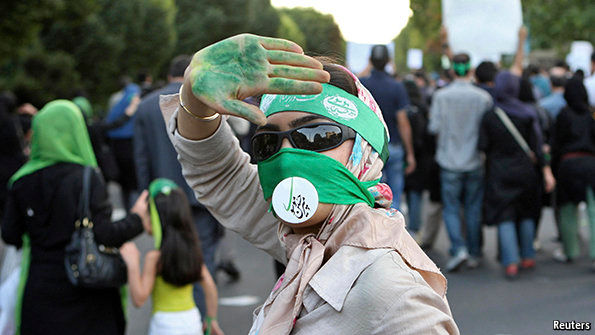Source: www.economist.com
While Iran reopens to the West, repression still prevails at home
Mar 24th 2016 | Middle East and Africa

DESPITE a lessening of tension between Iran’s government and the West since last year’s agreement over the country’s nuclear programme, draconian punishments of criminals and dissidents persist, according to a report by the UN’s Human Rights Council. At least 966 executions are said to have been carried out in 2015, one of the highest rates in the world, up from 750 in 2014. Some sources, according to the report, put the figure above 1,000. It notes that 25 people were executed in one day last year in a prison close to Tehran, the capital. It particularly laments the execution of juveniles; at least 16 have been hanged in the past two years for crimes committed when they were under 18; at least 160 young offenders are on death row.
The report also criticises Iran for inflicting corporal punishment on alleged miscreants, with amputations of limbs, floggings (often in public), stoning and blinding. At least 47 executions were carried out in public, says the UN council, often with children present. The report says that “no improvement was observed regarding the situation of religious and ethnic minorities.”
The authorities point out that most of the executions were for drug-related crimes, including armed drug-smuggling. But the council’s report, presented by Ahmed Shaheed, a former foreign minister of the Maldives who is the UN’s special rapporteur for human rights in Iran, notes that the death penalty can be imposed for minor drug-related offences, such as possession of only 30 grams of amphetamines. Moreover, a large number of those executed are foreigners, who sometimes have little chance to defend themselves in court, for instance because they lack proper facilities for translation. Around 1,200 Afghans are said to be on death row, many for drug offences.
At least five instances of amputations were cited and three of blinding; in one instance, a left eye and a right ear were surgically removed under the law of qisas, whereby a person can insist that a tit-for-tat punishment be imposed on a wrongdoer to match the original crime. Under the Islamic Penal Code that came into force in June 2013, the right of the aggrieved to insist on such retribution cannot be overruled by the judiciary.
At least 47 political journalists and social-media activists are said to be behind bars, as of January 2016. Mehdi Mousavi, a poet, was sentenced to 11 years in prison and 99 lashes for “insulting the sacred” in his verses. More than 272 internet cafes were reportedly closed in 2015 for being a “threat to societal norms and values”. Mir Hosein Mousavi and Mehdi Karroubi, the two leaders of the Green Movement who led the street protests in 2009 after what they said was a stolen election, have been under house arrest for more than five years.
Among those discriminated against for holding heterodox religious views, the Bahai community continues particularly to suffer. Bahai cemeteries were desecrated and the state-owned media spread false statements about Bahai beliefs and practices. At the end of last year, 80 Bahais were reported to be in prison “solely for their religious beliefs”, including seven leaders arrested in 2008 who are serving ten-year sentences on such charges as espionage, “propaganda against the regime” and “spreading corruption on earth”. For the same supposed crime, the death penalty was imposed on Muhammad Ali Taheri, the founder of a spiritual movement that promotes alternative medical theories, for establishing a “diversionary cult”.
The UN report also bemoans restrictions on women. It cites the head of Tehran’s traffic police saying in December last year that in the previous eight months there had been 40,000 cases of women being stopped for “bad hijab”—driving without the required covering of hair. Offenders’ vehicles are often seized and their owners taken to court.
On the broad front of women’s rights, the document notes that only 3.1% of parliamentarians are women; there are apparently no female judges or members of the two highest bodies in the land, the Guardian Council and the Expediency Council. It laments that the minimum age of marriage is still 13; a bride can be younger if her father or a court gives permission.
Mr Shaheed holds out some hope that the new parliament elected last month will improve Iran’s human rights record and “re-examine laws that have contributed to a staggering execution rate”. He also applauds “recent amendments to the country’s criminal procedure code that expand rights for the accused”. But his report notes warily that ten Iranians who helped research the previous Human Rights Council’s report suffered reprisals as a consequence.
Leave a Reply